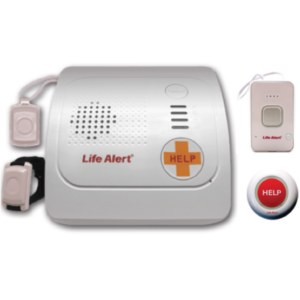Rizza Royce Mira, M.D. and writer, explained that there are a few reasons for this lack of coverage. “Although these gadgets can provide peace of mind and assistance in an emergency, Medicare does not consider them ‘essential medical devices,’” she said. They are not considered “medically required,” either, which means they do not directly benefit a person’s health in any way.
However, some Medicare Advantage plans—also known as Medicare Part C—and long-term care insurance offered by private insurance companies may cover at least a portion of medical alert system costs.
What Is Life Alert?

Life Alert is one of the most recognizable medical alert systems on the market, thanks to the iconic “Help! I’ve fallen and I can’t get up!” television commercials. Because Life Alert has become such a household name, it is sometimes used to describe all medical alert systems. However, there are several different medical alert system brands, and Life Alert is just one of them.
To get pricing and contract details from Life Alert, you will need to call the company’s toll-free number and speak with a sales representative, who will most likely give you a sales pitch to convince you to sign up for the service.
Life Alert offers three different monitoring packages:
- In-home system (includes wearable pendant button)
- In-home system and waterproof help button for shower emergencies
- In-home system, waterproof help button for shower emergencies, and GPS system to use outside the home
The company promises that distress signals will be responded to within seconds by someone in its owned-and-operated, U.S.-based monitoring center. While impressive, that service comes at a steep price and requires a three-year commitment. And you won’t know that price by looking at the company’s website.
The bottom line is that Life Alert requires users to sign a three-year contract. Monthly monitoring fees range from $49.95–$89.95, depending on the system (or systems) you choose. The contract ensures that your rate doesn’t increase during those three years.
Cancellations before the three-year term ends can only be made under two conditions: the user now requires 24-hour care in the home or a long-term care facility, or the user has passed away. If none of these three conditions are met, the company does not offer early cancellations.
There is only one circumstance in which the company will issue a refund: if your loved one passes away at home, whether or not they tried to call for service. Life Alert will refund 100% of all services, including the installation fee in this case.
If you are unsure if Life Alert is for you, please read our Life Alert Alternatives guide.
Which Parts of Medicare Cover Life Alert?
Medicare is a government-run program that provides health coverage for people who are 65 years or older, or those who are younger than 65 with disabilities, regardless of their income.
Original Medicare coverage includes Part A and Part B. Medicare Part A covers inpatient hospital stays, nursing home care, hospice care, and some home health care services. Medicare Part B covers some doctors’ services, outpatient care, medical supplies, and preventive services. Both Part A and Part B don’t offer coverage for personal emergency response systems.
Medicare Part C, also called Medicare Advantage, is another Medicare supplement health plan offered by private health insurance companies. You pay extra for Medicare Advantage benefits, and in return, you get the same coverage provided by Medicare Part A and Part B, plus other benefits like vision and dental. Depending on the insurance provider, this Medicare plan may cover a portion of the cost of a personal emergency response system.
Some Medicare Advantage plans offer discounts on medical alert systems or for a specific brand.
Some of the medical alert systems currently on the market today have monthly monitoring charges that begin as low as $19.95 and increase in price according to the type of plan selected. Some companies also charge a one-time activation, setup, and/or equipment fee.
Some Medicare Advantage plans offer discounts toward medical alert systems or a specific brand of medical alert system. For example:
- Aetna’s Medicare Advantage members can get a special discount on LifeStation, which provides medical alert systems and 24/7 monitoring with no long-term contract for about $20–$30 per month.
- Cigna-HealthSpring plans offer discounts on several products and services, including medical alert systems.
- Eligible Humana Medicare Advantage customers can receive the Philips Lifeline medical alert equipment and monthly service for free.
How Much Do Medical Alert Systems Cost?
Some of the best medical alert systems currently on the market today have monthly monitoring charges that begin as low as $19.95. The average monthly price for a medical system is about $20–$60. Some companies also charge a one-time fee for activation, setup, or a separate equipment fee.
Life Alert’s monthly fee ranges in price from $49.95–$89.95, making it one of the pricier brands. Life Alert also charges a one-time activation fee of either $96 or $198, depending on the plan. Several companies offer medical alert monitoring for less than $30 a month, and some don’t require up-front costs.
Other medical alert companies offer add-ons like fall detection or health and wellness features, which Life Alert does not. Shop around and review other brands before committing. Our review of the best medical alert system brands on the market today is a great place to start your research.
Alternative Options for Discounts on Medical Alert Systems
There are several ways someone can get a discount on medical alert systems, including Life Alert.
Medicaid
Medicaid may help pay for medical alert systems. Medicaid’s Home and Community Based Services program provides waivers for older adults to receive long-term care services at home rather than in a long-term nursing care facility. These waivers provide about $20–$70 in monthly funding, which may cover the monthly fee of standard medical alert systems.
Medicaid also provides Personal Care Services, which provides funding for assistive care. Medicaid does not specify that these funds be used for medical alert monitoring but instead leaves it up to the consumer to decide how best to use the money.
Long-Term Care Insurance
Some private health insurance providers offer long-term care insurance, which helps pay for the costs associated with long-term care. Also, like Medicare Advantage, some long-term care insurance plans may cover medical alert systems.
VA Benefits
Discounts may be available for military veterans through the Department of Veterans Affairs (VA). “For retired military personnel and their families, TRICARE may cover the cost of a medical alert device, although coverage is not guaranteed,” Dr. Mira said. “LiveLife Personal Mobile Alarms or MedEquip Alert can provide a medical alert system to veterans who apply for VA support.”
These two medical alert systems are available to veterans for free.
Manufacturer Discounts
Many medical alert manufacturers–including LifeFone, Medical Guardian, and MobileHelp—have promotions throughout the year, such as a free month of monitoring, free shipping, or free add-on equipment.
Medical Alert Systems With No Monthly Fee
Some medical alert systems don’t require a monthly fee. Instead of connecting you to a 24/7 call center staffed by trained attendants, you’re connected to either a preselected personal caregiver or your local 911 center.
Assistance Programs
Some assistance programs cover the cost of medical alert devices. “Contact your local Area Agency on Aging,” Dr. Mira suggested. “The agency may connect you with other organizations or provide information on grants and scholarships for seniors.”
Why You Can Trust Us
You deserve the best products for a better quality of life. As such, we strive to create honest, helpful reviews. Our experts independently research and recommend products we believe provide value in the lives of our readers.
We’ve spent collectively more than 1,700 hours conducting in-depth research on medical alert systems. Our content is medically reviewed and unbiased to help you choose the right medical alert system for you or your loved one.
We did the following when researching Life Alert medical alert systems:
- Engaged in ongoing independent research
- Consulted with geriatricians and adult caregivers
- Mystery shopped the brands
- Surveyed medical alert system users
- Interviewed experts in the field
- Read verified customer reviews from trusted third parties such as Better Business Bureau and Consumer Reports


